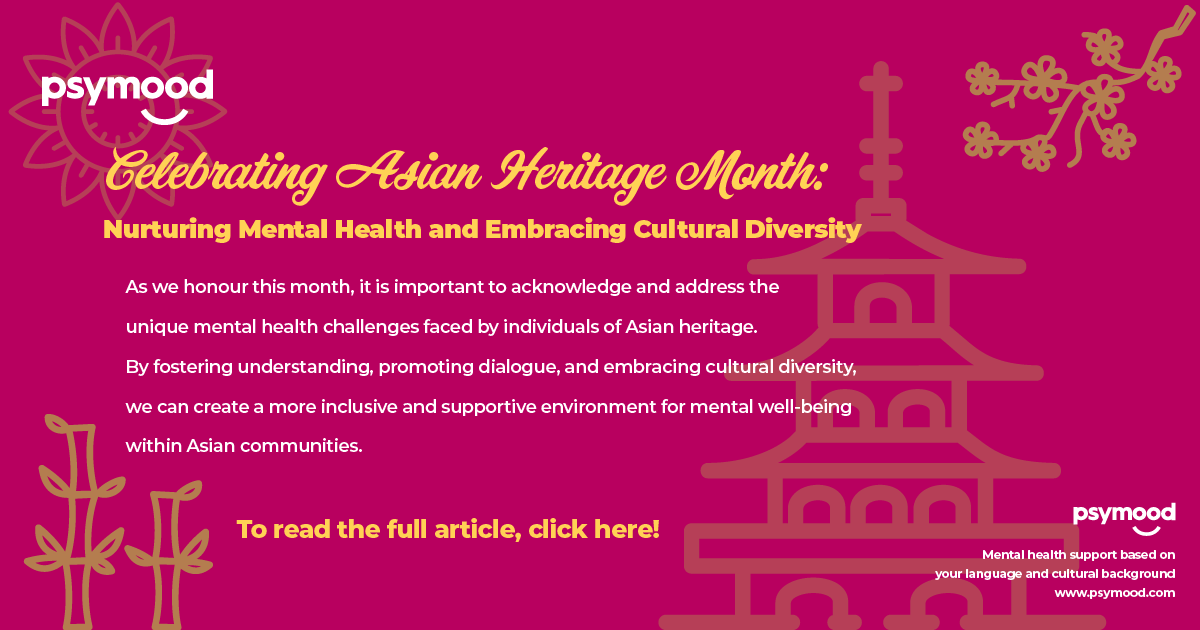Celebrating Asian Heritage Month: Nurturing Mental Health and Embracing Cultural Diversity
Asian Heritage Month is a time of celebration, reflection, and appreciation for the rich tapestry of Asian cultures and the invaluable contributions of Asian communities. As we honour this month, it is important to acknowledge and address the unique mental health challenges faced by individuals of Asian heritage. By fostering understanding, promoting dialogue, and embracing cultural diversity, we can create a more inclusive and supportive environment for mental well-being within Asian communities.
Stigma Within Asian Communities
One of the prominent issues affecting mental health in Asian communities is the stigma surrounding mental illness. Deep-rooted cultural beliefs, societal expectations, and pressures to conform can hinder individuals from seeking help and support. It is crucial to combat stigma through open conversations, education, and awareness, emphasizing that mental health is a vital aspect of overall well-being. Let’s take a more in-depth look at how stigma plays a role in mental health within the Asian community:
Cultural norms and expectations: Asian cultures often place a strong emphasis on collectivism, family reputation, and maintaining a sense of harmony. Mental health challenges can be seen as a personal failure or a source of shame, leading individuals to hide their struggles and avoid seeking professional help.
Lack of awareness and education: Stigma surrounding mental health in Asian communities can stem from a lack of understanding and awareness about mental illnesses. Misconceptions, stereotypes, and the perception of mental health issues as a weakness or character flaws can perpetuate stigma and prevent open discussions about mental well-being.
Cultural and language barriers: Language barriers and limited access to culturally competent mental health services can further contribute to stigma. Difficulties in articulating mental health issues in a second language or cultural context, as well as the scarcity of mental health professionals who understand the cultural nuances, can deter individuals from seeking help.
Gender and generational dynamics: Traditional gender roles and generational gaps can add additional layers of stigma. Expressing vulnerability or seeking mental health support may be viewed as a sign of weakness, particularly for men or older generations who adhere to more traditional norms.
Cultural Influences and Mental Health
Asian cultures are incredibly diverse, each with its own traditions, values, and approaches to mental health. Understanding these cultural nuances is essential in providing effective mental health support. Culturally sensitive care takes into account the unique perspectives, beliefs, and practices of Asian communities, bridging the gap between traditional healing methods and Western approaches. By incorporating cultural competence in mental health services, professionals can create a safe space where individuals feel understood and supported.
Intersections of Identity
The mental health experiences of individuals of Asian heritage are shaped not only by their cultural background but also by intersecting identities such as gender, sexuality, and generational differences. LGBTQ+ individuals, for instance, may face additional challenges due to cultural norms and expectations. Recognizing and addressing these intersections is vital in providing inclusive mental health care that meets the diverse needs of Asian communities.
Navigating Barriers and Accessing Care
Accessing mental health care can be a significant challenge for many individuals of Asian heritage. Language barriers, financial constraints, and limited knowledge about available resources can prevent individuals from seeking the support they need. It is crucial to enhance access to culturally appropriate mental health services, provide multilingual resources, and collaborate with community organizations to bridge the gap and ensure equitable mental health support for all.
Embracing Resilience and Well-being
Asian communities have a long history of resilience, strength, and communal support. Celebrating Asian Heritage Month provides an opportunity to highlight the resilience and wellness practices embedded in Asian cultures. Practices such as mindfulness, meditation, traditional healing arts, and community support systems can be integrated into mental health promotion efforts, empowering individuals to prioritize their well-being.
Final Thoughts
Asian Heritage Month is not only a time to celebrate the vibrancy of Asian cultures but also an opportunity to address mental health issues within these communities. By promoting awareness, combating stigma, providing culturally sensitive care, and enhancing accessibility, we can create a society that supports the mental well-being of individuals of Asian heritage. Let us embrace diversity, celebrate resilience, and work together to ensure that mental health is prioritized.
PsyMood is a digital tool designed to help you find the support you need in the language that you are most comfortable with. PsyMood considers cultural background, geographical location, interests, and personal needs, amongst other factors, to pair you with service providers for either online or in-person therapy sessions.


.png)
.png)
.png)
Recent Comments